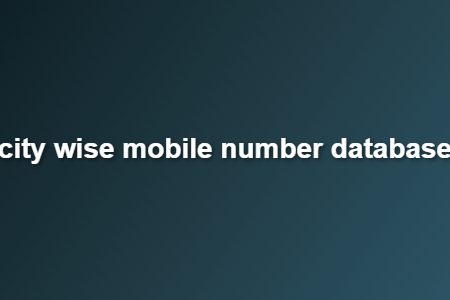In today’s fast-paced business world, connecting with potential customers is crucial. Many businesses find that targeting people in a specific area, like a particular city, can be very effective. This is where a “city-wise mobile number database” comes in. It’s a collection of mobile phone numbers, organized by city or region. Such a database promises to help businesses send messages or make calls directly to people in a chosen local area. This article will explain what these databases are. We will explore their potential benefits for businesses. Most importantly, we will dive deep into the legal and ethical considerations of using such data. We will also look at how to build and use these lists responsibly and effectively.
What Is a City-Wise Mobile Number Database?
A city-wise mobile number database is a collection of mobile phone numbers. Each number is linked to a City-Wise Mobile specific city or geographic area. These databases often include additional information. This might be the name of the person or business associated with the number. It could also include their address or other demographic details. The main idea brother cell phone list behind these databases is to allow businesses to conduct highly localized marketing campaigns. They can send text messages or make calls to people only in the areas they serve.
These databases are typically compiled by data providers. They gather information from various sources. The aim is to City-Wise Mobile help businesses perform targeted outreach. However, the origin and legality of such data are very important. We will discuss these aspects in detail.
Why Target by City with Mobile Numbers?
Targeting customers by city with mobile numbers offers significant advantages. First, it allows for hyper-local marketing. If your business is a local restaurant, you only want to reach people nearby. A city-wise list ensures your message goes to potential customers in your service area. Second, it can increase relevance. A message about a local event or a specific store opening will resonate more with local residents. This makes your marketing more effective.
Third, it helps optimize marketing spend. You avoid wasting money on ads or calls to people who are too far away. This makes your campaigns more cost-efficient. Finally, it supports local business growth. By connecting directly with the community, you can build stronger customer relationships. Therefore, city-wise mobile number databases can be a powerful tool for localized business expansion.
Who Uses City-Wise Mobile Number Databases?
Many different types of businesses and organizations might consider using city-wise mobile number databases. Local businesses are primary users. This includes restaurants, retail stores, gyms, and repair services. They want to reach people living or working in their immediate vicinity. Real estate agents use them to find potential buyers or sellers in specific neighborhoods. Event organizers promote local concerts, festivals, or workshops.
Political campaigns often use them for local voter outreach. Non-profit organizations might target local residents for community events or donation drives. Any entity with a strong local focus can find while the flights can differ in pricingopens value in such targeted lists. The goal is always to connect with people who are physically close to their operations or services.
Information Typically Found in These Databases
A city-wise mobile number database usually contains core information. This includes the mobile phone number itself. It will specify the city or region associated with that number. Beyond that, the quality and type of additional data can vary greatly. Some databases might include the full name of the subscriber. They could also have their age range or gender. Household income or interests might be estimated.
For business-to-business (B2B) purposes, the database might link numbers to specific businesses within a city. It could include company names, industry types, or employee counts. The more data points included, the more precisely you can segment your audience. However, the presence of more personal data also increases privacy concerns and legal scrutiny.

How Are These Databases Allegedly Compiled?
Companies that offer city-wise mobile number databases claim various compilation methods. Some might use publicly available directories, though specific mobile numbers are rarely public. Others might employ web scraping tools to gather numbers from websites or online listings, which may not always be legal or ethical, especially if consent isn’t clear. Some claim to use data partnerships, where they exchange or license data from other companies.
More sophisticated, but often controversial, methods involve aggregating data from apps or online services where users might have unknowingly given permission. It’s crucial to understand that directly purchasing lists of mobile numbers often raises significant legal and ethical questions, particularly concerning consent and privacy laws like GDPR and TCPA.
Potential Benefits of Targeted Local Outreach
Targeted local outreach, facilitated by city-wise mobile numbers, can yield several benefits. It allows for highly relevant messaging. You can promote offers or events that are only available in a specific area. This increases the chances of engagement. It can lead to higher conversion rates. People are more likely to act on something convenient and local.
Furthermore, it enables efficient resource allocation. Marketing budget is spent only on reachable prospects. This reduces wasted ad spend. It also helps in building local brand loyalty. By consistently reaching out to a local community with relevant offers, businesses can foster strong relationships. These relationships can translate into repeat business and positive word-of-mouth referrals.
The Critical Legal and Ethical Landscape
The use of city-wise mobile number databases is a minefield of legal and ethical challenges. This is the most crucial section to understand. Mobile phone numbers are considered personal data in almost every jurisdiction worldwide. Laws like the General Data Protection Regulation (GDPR) in Europe and the Telephone Consumer Protection Act (TCPA) in the United States impose strict rules on how mobile numbers can be collected, stored, and used for marketing.
A fundamental requirement in most places is prior express consent. This means you must have clear, unambiguous permission from an individual before you send them marketing text messages or make automated marketing calls. Simply buying a list of numbers, even if categorized by city, does not grant this consent. Using such lists without consent can lead to massive fines, costly lawsuits, and severe damage to your brand reputation.
Consent Requirements: A Global Standard
Across the globe, the trend is towards stricter consent requirements for mobile marketing. In the EU, GDPR mandates “explicit consent” for most direct marketing. This means a clear, affirmative action by the individual (e.g., ticking an unticked box) indicating their agreement. In the US, the TCPA requires “prior express written consent” for automated ao lists calls and texts. This is even stricter. It means the consent must be in writing (which can be electronic) and specifically state that the person agrees to receive marketing messages from your specific company.
Many countries also maintain “Do Not Call” (DNC) registries. You must scrub your lists against these registries before making any telemarketing calls, even if you have consent in some cases. Ignoring these rules is not just unethical; it is illegal and can result in severe penalties.
Building Your Own Ethical City-Wise Mobile Number List
Given the legal and ethical complexities of purchased lists, the most responsible and sustainable approach is to build your own city-wise mobile number list. This ensures full compliance and higher quality leads. First, use opt-in forms on your website. Offer valuable content like “Local Deals Alert” or “Community Event Updates.” People provide their mobile number to receive these updates. Clearly state that they are opting in for marketing messages.
Second, run SMS-only promotions at your physical location. Ask customers at the point of sale if they’d like to receive exclusive text message discounts. Clearly display a short code or QR code in your store. People can text a keyword to opt-in. Third, leverage social media contests or giveaways. To enter, participants provide their mobile number and explicitly consent to receive marketing texts. Always be transparent about how their number will be used.
